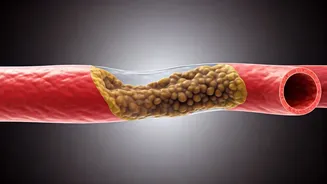Breakfast: A Foundation
Arteries, vital pathways for carrying oxygen-rich blood, can become constricted due to plaque accumulation, a condition known as atherosclerosis. This
process, often gradual and symptomless, significantly elevates the risk of heart attacks and strokes. The importance of breakfast as a cornerstone of cardiovascular health is consistently highlighted by medical professionals. For years, breakfast has been regarded as a vital meal, but the modern pace of life has led many to forgo it altogether or grab quick, unhealthy alternatives. This includes delaying the meal in the name of intermittent fasting, weight management or because of time constraints. Now, research reveals that skipping breakfast has serious implications for your arteries and heart health. So, let’s get into the details of the breakfast-artery connection.
The Silent Damage
Skipping breakfast disrupts the body's natural rhythms, quietly damaging arteries. This seemingly innocuous habit has been linked to an 87% increase in heart death risk, according to studies. When you miss breakfast, the body reacts by releasing stress hormones like cortisol. This hormone surge ignites inflammation, a key player in the hardening of arteries. Furthermore, skipping breakfast leads to the consumption of high-calorie or processed foods later in the day. This diet choice elevates triglyceride levels and strains the vascular system. It is very important to get this meal in to avoid any health problems and provide the body with essential nutrients.
Cholesterol and Blood Pressure
Skipping breakfast triggers a cascade of physiological effects that can speed up artery damage. People who regularly skip their morning meal tend to have elevated levels of LDL (bad) cholesterol, higher blood pressure, and increased insulin resistance. These three factors combine to significantly increase the risk of plaque formation in the arteries. Arteries are like the body's highways, delivering essential nutrients and oxygen. When these highways get blocked, it's a major problem. It’s important to understand the consequences of missing breakfast to make more informed choices about your health. Prioritizing a nutritious breakfast helps keep these vital pathways clear.
Breakfast Pattern Study
A recent analysis examined the link between breakfast habits and early artery disease. Researchers categorized participants into three groups: those who skipped breakfast (consuming less than 5% of their total daily calories in the morning), those who ate a high-energy breakfast (more than 20% of daily calories), and those who had a low-energy breakfast (5-20% of total daily calories). The study revealed that 3% of participants skipped breakfast, 27% opted for a high-energy breakfast, and 70% had a low-energy breakfast. These findings underscore the importance of how and what you eat for breakfast. Understanding these patterns can guide you in making healthier food choices that support your arterial health.
Foods for Arterial Health
A cardiologist recommends incorporating five specific foods into the diet to help reduce heart blockages and repair blood vessels. Making these dietary changes can significantly improve arterial health, potentially reducing the risk of cardiovascular diseases. The foods recommended in the study haven’t been mentioned in this article. Adding heart-healthy foods into your diet is essential. Also, making small changes to your morning routine can significantly impact your cardiovascular health. It is suggested to take a close look at your morning habits. So, consider these tips to help you embrace a heart-healthy lifestyle and enhance your overall well-being. Remember, small steps make a big difference.















